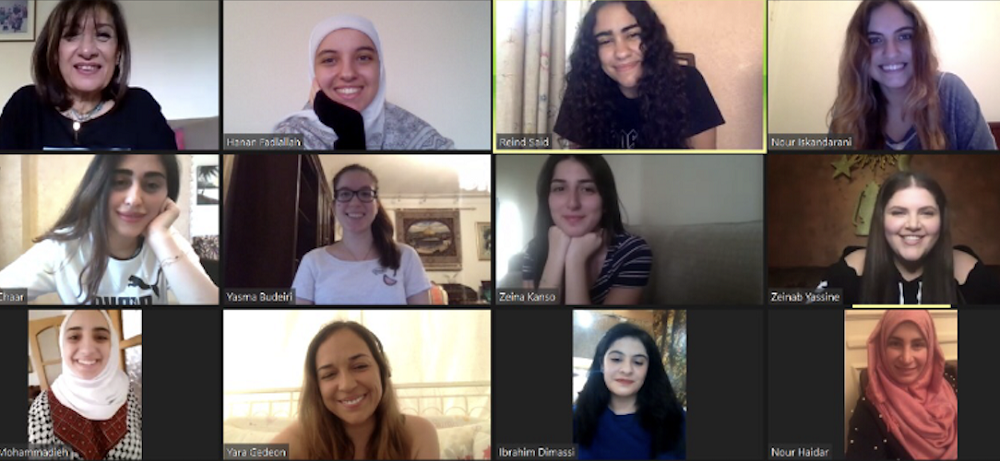
The Dodge Foundation Teacher Training Scholarship Program: transforming lives
December 3, 2020
In November 2018, the Cleveland H. Dodge Foundation awarded AUB $500,000 to support a three-year teacher training scholarship program that provides full tuition for up to 28 students for a one-year, 21-credit teaching or special education diploma program. “The focus of the Dodge Scholarship Program is right on target in responding to a growing need for qualified teacher leaders in private and semi-private schools which serve economically and socially disadvantaged students,” says Dr. Murad Jurdak, who chairs the Dodge Scholarship Committee. The first cohort of students joined the program in fall 2019. Remarkably, and despite the extraordinary challenges of the 2019-20 academic year due primarily to the disruption caused by COVID-19, the first five students graduated as scheduled in June 2020.
Students selected for the program are required to make a commitment to work at schools that serve primarily underprivileged students. Although this requirement might be a difficult commitment for some students to make, it was one of the attractions for Dina Al Mawed. “As a young Palestinian living in a refugee camp, I daily see my people facing economic and social hardships and insecurity,” she explains. “I have always felt that teaching gives me a sense of empowerment to initiate a change in the lives of others. I decided to become a teacher and give the best of what I have learned to those who are highly in need of an education. I have only one life and one chance to grow and shine, so why not do it right by giving back to my community, country, and the world?”
Jessica Dina was also attracted to teaching because she wants to give back. “I have seen how learners who excel in academics often don’t know how to handle disagreements, how to build constructive relationships with others who are different, and how to manage their feelings.” She continues, “I see teaching as a chance to teach kids more about dialogue and about how differences are constructive, not destructive. After all the only way to change the future is to educate future generations,” she says. Like Dina, Jessica is looking forward to working with underprivileged students. “I am happy that I will be working with them. I lived in difficult circumstances for a while, and I know how it feels.”
Halima Makarem, another member of the first cohort, originally thought that she would be a researcher or a scientist “studying and discovering more and more facts each and every day, on which medicine, pharmacy, nursing and all health disciplines are based.” She quickly realized though that she wanted the “psychological, communicational, and emotional interaction” that she enjoyed tutoring students, something she had done for many years to earn extra money. Halima particularly enjoyed the special education course she took that “changed my perspective of people with special needs from compassion to respect. I also came to understand,” she explains, “that some special needs are not as obvious and that there is often an underlying biological, social, or/and psychological reason for bad behavior.”
Raneem Saleh, who is currently working for Teach for Lebanon, was also attracted by the special education courses that AUB offers. “One of the things that motivated me to know more about learners with exceptionalities was a close family member. This child was my motivation to go deeper into education, specifically special education, in order to know more about this world,” she says. An especially useful skill that she developed during the one-year program was learning how to develop Individualized Education Programs (IEPs). Raneem is hoping to go back to school at some point to earn a graduate degree. She also wants “to make an impact within the educational system in Lebanon, starting from providing access to quality education for all the students regardless of socioeconomic background.”
Hitaf Al Mounajed was working as a teacher in Aramoun when she joined the program in fall 2019. Although she already had experience in the classroom, she says that she learned a lot of practical knowledge during the one-year diploma program – not just how to be an effective educator, but also how to teach online. She says that the Dodge Program helped “engage more with what I believe is right. I feel that I am having an impact on the students I am teaching – especially when I tell them my story,” she says.
“All of us at the department,” explains Department Chair Tamer Amin, PhD, “are deeply committed to the goals of the Dodge Program: to train more certified teachers to work in schools serving children from less affluent families.” Another goal of the program is to provide follow-up professional development for Dodge Scholarship graduates and help upgrade the skills of other teachers working in schools serving the less privileged. Amin explains that the COVID-19 pandemic and the impact of the August 4 explosion in the Beirut port have affected many schools in Beirut. This has required the department to rethink the professional development component of the program, linking it to the department’s efforts to support the schools that have been most impacted. He explained that Dodge Scholarship graduates will be integrated into this professional development program as “assistant trainers.” “Like everyone around the world these days, we are constantly having to adapt to unexpected challenges. In Lebanon, there are additional considerations that need to be addressed, but our commitment to the program and to the educational sector in Lebanon and the region is strong. We greatly appreciate the support the Dodge Foundation has provided for this important initiative.”
AUB trustee and president of the Cleveland H. Dodge Foundation William D. Rueckert noted that the foundation has been dedicated to helping provide educational programs for under-resourced communities in the US and the Middle East for more than 100 years. “Through our longstanding history with AUB, we welcomed the chance to partner with AUB’s already strong education program to provide support for much-needed teacher training scholarships in Lebanon,” he said. “The added post-graduation service requirement confirms the commitment of the students. We are confident they will all go on to be very successful teachers.”
